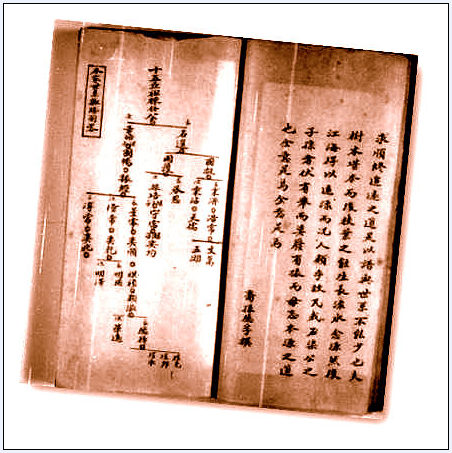In Europe and America genealogy has long been a one-person task, with the family historian recording and maintaining the family’s history.
Along the way that person hopefully made copies of the history and gave them to other members of the family. Typed or published, these would be kept and passed down in families. Did copies of your family history make it down to you?
Genealogy an Asian Tradition
In China, Korea and Japan these family histories or clan genealogies would be maintained at a designated temple that centralized the recording and maintaining of that family’s records. Copies were often made and passed down in the family to the current generation, with the copy at the Temple serving as a physical backup.

These genealogies can easily go back one thousand years—or, as in the case of the Confucius family, go back for 2,500 years. The Confucius family history is recorded for more than 80 generations and is maintained by the Confucius Genealogy Compilation Committee, which has 450 branches around the world. That’s a lot of genealogists documenting one family history.
Publishing Family Histories
Family histories are often some of the oldest surviving “books” in countries all over the world. In Ireland the Leabhar na nGenealach was written in 1649-1650. It is a massive nine-volume record of families in all parts of Ireland and Gaelic Scotland.
Publishing and disseminating copies of your family history is essential, but it doesn’t stop there. Genealogists who spend decades compiling and organizing their research and then publish it in book form immediately go back to work the next day, picking up and extending the branches of the family tree from where their published book left off. In too many cases the life’s work and research notes of a solitary genealogist are never published and are simply lost when that person dies.
Why do genealogists not publish?
Typically a genealogist thinks his work is never done.
There is always one more obituary or marriage record that needs to be found. That obituary in turn gives clues for an additional search and then another.
Is there a middle ground?
Yes—today’s technology lets us put our research online in real time.
Every day as we research, we can put our results online so that our latest hunches and conclusions can be shared and immediately vetted by cousins researching the same family lines.
These online trees are effective and have created a new opportunity for genealogists. Sourcing has become easy on these sites, making it possible for anyone wanting to verify the data to just click and see the original sources.
Game-changer
So—instead of a life’s work being lost, your family history research can be permanently preserved online. This is a major breakthrough. This is a game-changer. Research doesn’t have to be lost and recompiled over and over with each new generation.
This is important. Genealogists no longer have to rely on a library with published genealogies, reading them one by one to track a family history. This can now be done online. It’s true that—just like with a published genealogy—some of the conclusions might be wrong, but unlike the print edition of a family history, these online family trees all include links to the sources used to compile the family history.
Want to double check a person in your tree? With a click you can be reading the actual obituary in GenealogyBank or a birth certificate from Indiana.
Are you participating?
Are you putting your family information online—or are you keeping it protected in your cave at home?
I am online.
I am putting up all of the generations and family members in my family tree who have passed away—but, I do not put the current, living generation online so as to protect their privacy.
Will I still publish our family history as a book?
Yes, absolutely.
But—who knows when I will “finish” that book?
Thankfully, until that day gets here my research and notes are safely online on websites that I can control. I use two online family tree sites. One is set up so that only I can make changes in the text and the relationships. The other is set up so that anyone can add the relatives that they are more familiar with, letting me benefit from their expertise.
I can easily go online to change and edit my online tree. On the sites that make the online tree a group effort, I can track as others add to my data. By putting everything online, my data is preserved and secure and I can see/benefit from the research others are doing.
What approach are you taking to preserve and protect your family history?
Related Articles about Records Preservation:
- Find & Preserve Your Family’s Stories
- Organization & Preservation Tips for Genealogy Spring Cleaning
- Rescue Mission: 4-Step Plan for Preserving Family Bible Records
[bottom_post_ad]
